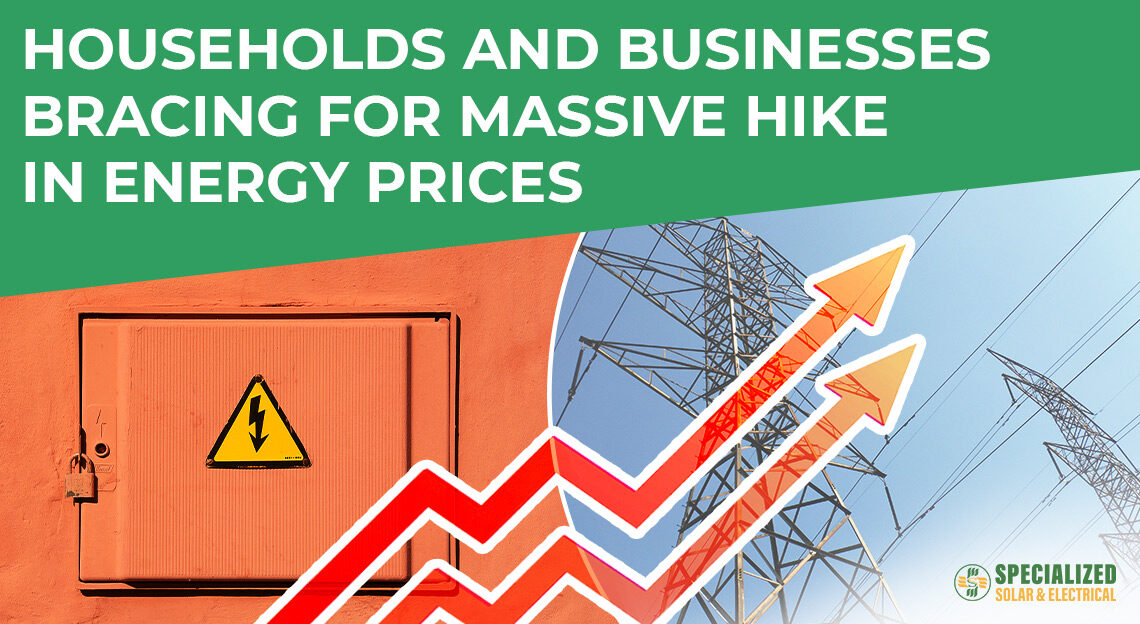Households and businesses across Australia are bracing for a massive hike in energy prices. From July 1, the benchmark price for electricity will increase by up to 19.7 per cent adding hundreds of dollars to residential electricity bills – and thousands of dollars to business bills.
Gas prices are also starting to skyrocket on the East Coast of Australia due to a gas energy crisis that’s been “a decade and a half in the making” according to a recent ABC report.
NSW is the worst affected state in terms of electricity prices – with the benchmark price for businesses rising by up to 19.7 per cent from July 1. And for NSW households, the benchmark price will increase by up to 18.3 per cent.
Victorian households and businesses are hit as well – but not as badly – with a benchmark electricity price increase of 5 per cent from July 1.
But that’s not all.
East Coast prices for gas on the spot markets soared by over 400 per cent in the last week forcing the Australian Energy Market Operator to cap prices. Because two-thirds of our gas supplies go to export markets, there’s limited supply for the domestic market. With global gas prices going through the roof due to the war in Ukraine, producers are capitalising on the opportunity by selling more of our domestic gas supplies overseas causing local gas prices to skyrocket.
The upshot is that Aussie homes and businesses will bear the brunt of the price hikes unless, of course, they have their own solar power system.
That’s why in the last week we’ve seen the level of solar enquiries increase more than ten-fold.
On this blog:
- What are benchmark electricity prices?
- What are the benchmark electricity price increases in Victoria and NSW?
- Is there any government financial support to help pay electricity bills?
- Your own solar power system: why it’s the best protection from rising energy prices.
What are benchmark electricity prices?
The benchmark electricity price – also known as the Default Market Offer or reference price – is the maximum amount that electricity retailers are allowed to charge customers.
Each state has a different benchmark price for electricity. This price is set by the Australian Energy Regulator and, in Victoria, by the Essential Services Commission. It reflects the price for electricity in your area.
By shopping around for better deals – for example on the Victorian Energy Compare website – households and businesses can find electricity prices that are lower than the default market offer.
What are the benchmark electricity price increases in Victoria and NSW?
Here are the increases in the benchmark electricity prices in NSW and Victoria from July 1, 2022.
For households
- NSW: between 8.5 per cent and 18.3 per cent
- Victoria: 5 per cent
For small businesses
- NSW: up to 19.7 per cent
- Victoria: 5 per cent
Is there any government financial support to help pay electricity bills?
In response to benchmark price increases, residents in NSW and Victoria will soon be able to access state government support to help pay their power bills.
In Victoria, every household can access a $250 one-off payment from the Victorian Government to help towards their energy costs. However, to get this payment, you must register on the Victorian Energy Compare website. This payment is available from July 1, 2022, and it is not means-tested.
The NSW government also provides relief to households with their power bills. However, the payments are means-tested, and you will need to meet the government’s eligibility criteria.
Financial support to help households pay electricity bills in Victoria and NSW
| Eligibility criteria apply? | Rebate value | |
|---|---|---|
| Victoria | Available to all Victorian households but you need to register for the rebate on the Government’s Energy Compare website. | $250 one-off payment – available from July 1, 2022 |
| NSW | Yes, for those having trouble paying their electricity bills. Check eligibility. | Up to $1,600 (up to $400 per application for electricity and up to $400 per application for gas bills twice a year) |
Your own solar power system: why it’s the best protection from rising energy prices
Without a doubt, the best way to reduce your exposure to electricity price rises is to install solar panels.
And, if you go a step further by adding battery storage, you will gain even more protection from soaring power bills.
According to Bruce Mountain, head of the Victorian Energy Policy Centre, these electricity price increases are ‘just the start’. Smaller electricity retailers, who are more exposed to wholesale market volatility, are starting to exit the market. This will reduce competition and mean that electricity prices could increase by as much as 50 per cent, says Mountain.
The higher electricity prices rise, the more you can save with solar. With a solar power system generating your own electricity, you won’t need to buy as much from the grid.
The average grid electricity price in Australia now is around 27 cent per kilowatt hour. If that rise to 35 cents or even 50 cents per kilowatt hour, that’s bad news for anyone who has to pay the electricity bills.
But what can you do about your gas bills?
If you want to reduce your exposure to rising gas prices, switching your gas appliances to electric and powering them with solar is a great money-saving strategy. But to do this you may require a bigger solar panel system than you’ve already got (or were thinking of getting). And you may want to do slowly – step-by-step over a few years – due to the investment required.
That’s why getting the right advice on solar and energy efficiency is so important.
Get in touch
If you’re keen to protect your household or businesses from rising energy bills, get in touch.
We are experts not just in solar panel, but also battery storage and energy efficiency solutions.
Every day we help households and businesses take the step towards greater energy self-sufficiency by designing and installing solar, battery and energy efficiency solutions that save money and help make our planet cleaner and greener.
Specialized Solar & Electrical is a Clean Energy Council Accredited Solar Retailer and Installer as well as a Registered Electrical Contractor.
Take control of your energy costs. Talk to us today.












